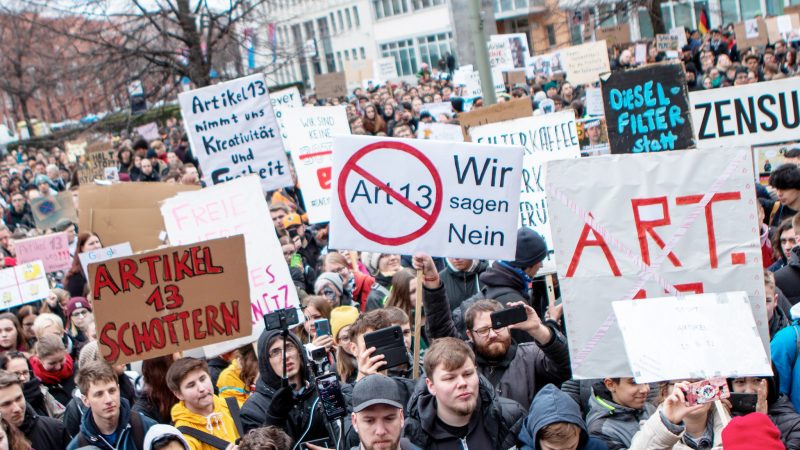An estimated 5,000 people gathered in Berlin on March 2 to protest a proposed EU copyright rule that could radically shift the dynamics of posting and sharing content online.
Among other provisions, Article 13 of the draft EU Copyright Directive would require internet platforms like YouTube to install “upload filters” — a technical mechanism that would block users from uploading copyright-protected content, effectively imposing a system of “prior censorship” on major internet and social media platforms.
The protest was part of a series of gatherings that will culminate in European Union-wide protests on March 23, netzpolitik.org reported.
Demonstrators in the German capital braved the icy cold weather and marched from the Axel Springer skyscraper, past the Ministry of Justice and on to the Brandenburg Gate. While the organizers had originally expected five hundred demonstrators, they estimated that more than ten times as many people came to demand protection of internet freedoms.
Demonstration gegen Internet-Urheberrechtsreform in Berlin:#Uploadfilter pic.twitter.com/h8RxdMVL87
— ZDF heute (@ZDFheute) March 2, 2019
Demonstrations against Internet copyright reform in Berlin. #Uploadfilter
The Berlin protest was organized by the alliance “Berlin gegen 13″ (Berlin against [Article] 13) which includes civil society organizations promoting digital rights and media freedoms, informal groups, and political parties opposing this aspect of the Directive.
According to the internet rights advocacy network European Digital Rights (EDRi), Article 13 was the result of closed-door discussions between the European Parliament negotiating team, EU Member States and the European Commission in February. Prepared by France and Germany, the current draft will be put to a vote between March and April in the European Parliament and could become law soon afterwards.
EDRi raised concerns that proposal could lead to unlawful restrictions on freedom of speech and reduce access to knowledge. Diego Naranjo, Senior Policy Advisor at EDRi commented:
The secret discussions have ended with the worst version of the “Censorship machine” we have seen so far. Citizens need to react, once again, to prevent these upload filters that threaten our freedom of expression from becoming reality.
The Berlin protest was third major offline gathering of people opposed to Article 13. Demonstrations in Cologne on February 16 and February 23 also attracted thousands of citizens.
In his speech at the Berlin protest, Markus Beckedahl the founder and editor-in-chief of media activism site netzpolitik.org stated: “We are not against copyright. But we are against compulsory upload filters!”
Demonstrators carried colorful signs reading “We are not bots,” “Diesel filter instead of upload filter”, “Save the Internet” and chanted the lyrics of the song “Wir sind keine bots” (We are not bots) made by YouTuber Willboy specifically in opposition to Article 13:
#SaveYourInternet #Berlingegen13 #artikel13 we are not bots 😉 pic.twitter.com/f70bfpCvOw
— Jos Poortvliet (@jospoortvliet) March 2, 2019
The song was released on Friday, a day before the demonstration, and become a viral hit with over half a million views in just a few days.
Julia Reda, Member of European Parliament for the European Pirate Party warned that the center-right European People’s Party, which has a majority in the European Parliament, has attempted to hold the vote ahead of the massive protest events scheduled for March 23 by the #SaveYourInternet activist campaign.
Breaking: @ManfredWeber and the @EPPGroup want the vote on #Article13 and the Copyright Directive moved ahead to next week to pre-empt the #SaveYourInternet/#StopACTA2 protests! We need a public outcry to stop this! pic.twitter.com/6XQSWNbgpa
— Julia Reda (@Senficon) March 4, 2019
Whether or not the Copyright Directive is approved, digital rights advocates will have more battles to fight in the near term, when it comes to policy proposals seeking automated technical solutions to online content challenges. A European Commission committee tasked with addressing “terrorist content” online has proposed a similar solution that would obligate online platforms to begin using automated tools to “detect, identify and expeditiously remove or disable access to terrorist content.”
At a public conference in January, Evelyn Austin from the Netherlands-based digital rights organization Bits of Freedom expressed deep concern about policies that move in the direction of prior censorship:
We see as inevitable a situation in which there is a filter for copyrighted content, a filter for allegedly terrorist content, a filter for possibly sexually explicit content, one for suspected hate speech and so on, creating a digital information ecosystem in which everything we say, even everything we try to say, is monitored.
Top image: March 2, 2019 demonstration in Berlin against Article 13 of the new EU Copyright Directive. Photo by Tim Lüddemann, (CC BY-NC-SA 2.0.)
Filip Stojanovski is the Eastern and Central Europe Editor at Global Voices. In web development since 1995, blogging since 2003 in English and Macedonian. Director for Partnership and Resource Development at Metamorphosis, Foundation for Internet and Society.
This article was sourced from GlobalVoices.org


Be the first to comment on "‘We are not bots!’ In Berlin, Thousands Protest Proposed EU Regulation on Internet Upload Filters"